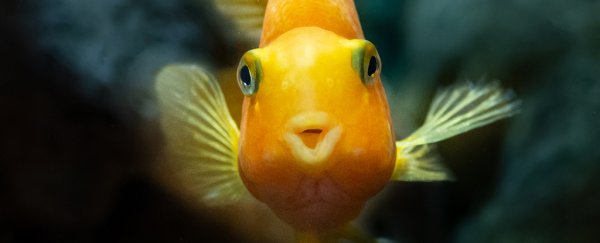Goldfish may have short memories but, according to an Israeli university study, they might be able to drive.
Researchers at Ben-Gurion University of the Negev found that a goldfish's innate navigational abilities allowed it to steer a robotic vehicle towards a terrestrial target if given a food reward.
To conduct their unusual experiment, the team placed a fish tank on a set of motorized wheels.
 The experiment. (Givon et al., Behavioural Brain Research, 2021)
The experiment. (Givon et al., Behavioural Brain Research, 2021)
A camera system then recorded the fish's movements in the water and translated it into navigational directions – effectively moving the contraption in the direction where the fish bumped up against the glass.
In a video released by the university, the fish can be seen "driving" the vehicle toward a visual target, a colorful mark on the wall of the experiment room, visible through the clear sides of the tank.
I am excited to share a new study led by Shachar Givon & @MatanSamina w/ Ohad Ben Shahar: Goldfish can learn to navigate a small robotic vehicle on land. We trained goldfish to drive a wheeled platform that reacts to the fish’s movement (https://t.co/ZR59Hu9sib). pic.twitter.com/J5BkuGlZ34
— Ronen Segev (@ronen_segev) January 3, 2022
When the fish steered the vehicle to the mark, it received a food reward.
"After a few days of training, the fish navigated to the target," the university team said in a press release.
"Moreover, they were able to do so even if they were interrupted in the middle by hitting a wall and they were not fooled by false targets placed by the researchers."
The peer-reviewed research, published in the Behavioural Brain Research journal, "hints that navigational ability is universal rather than specific to the environment," said Shachar Givon, a PhD student at the university's Life Sciences department who worked on the experiment.
